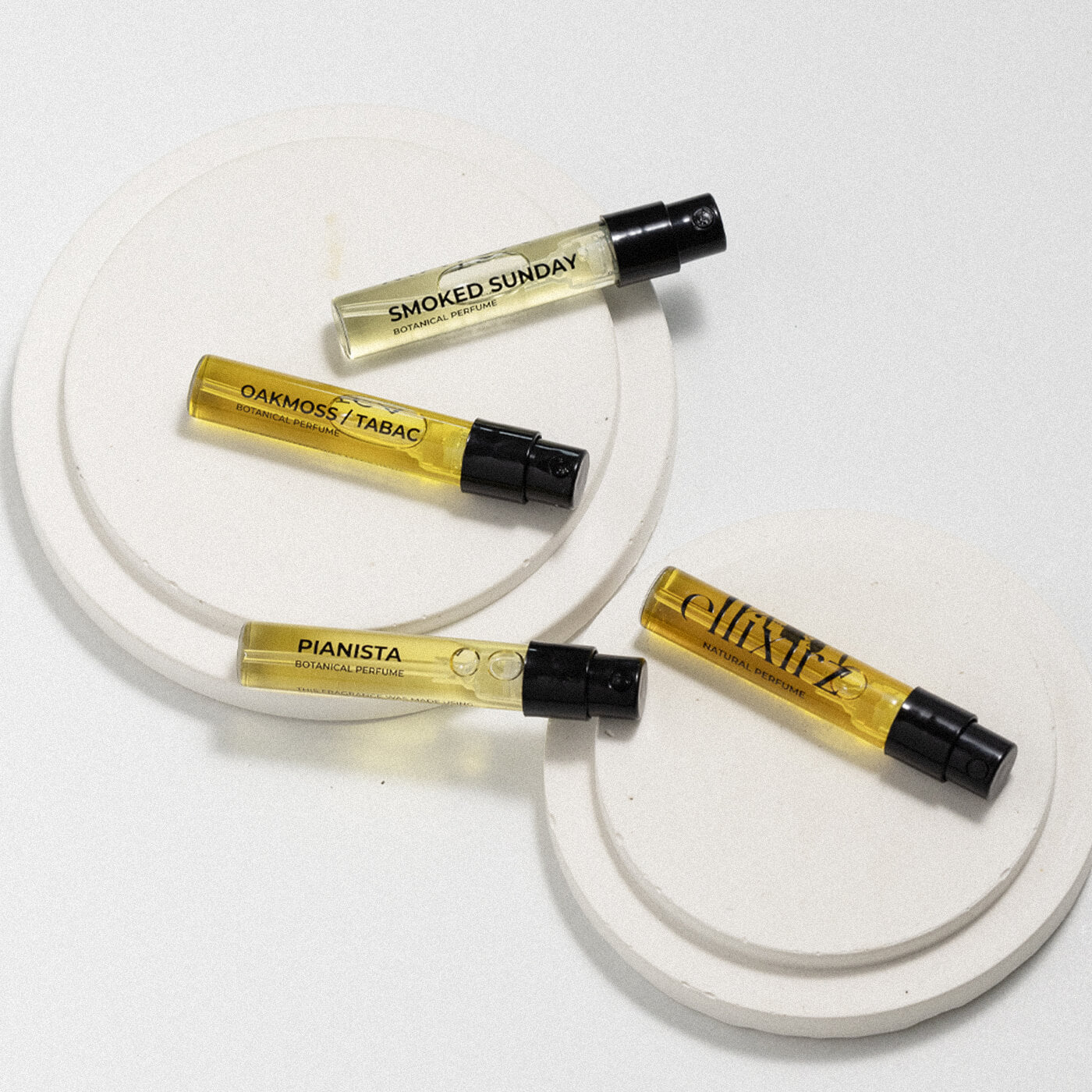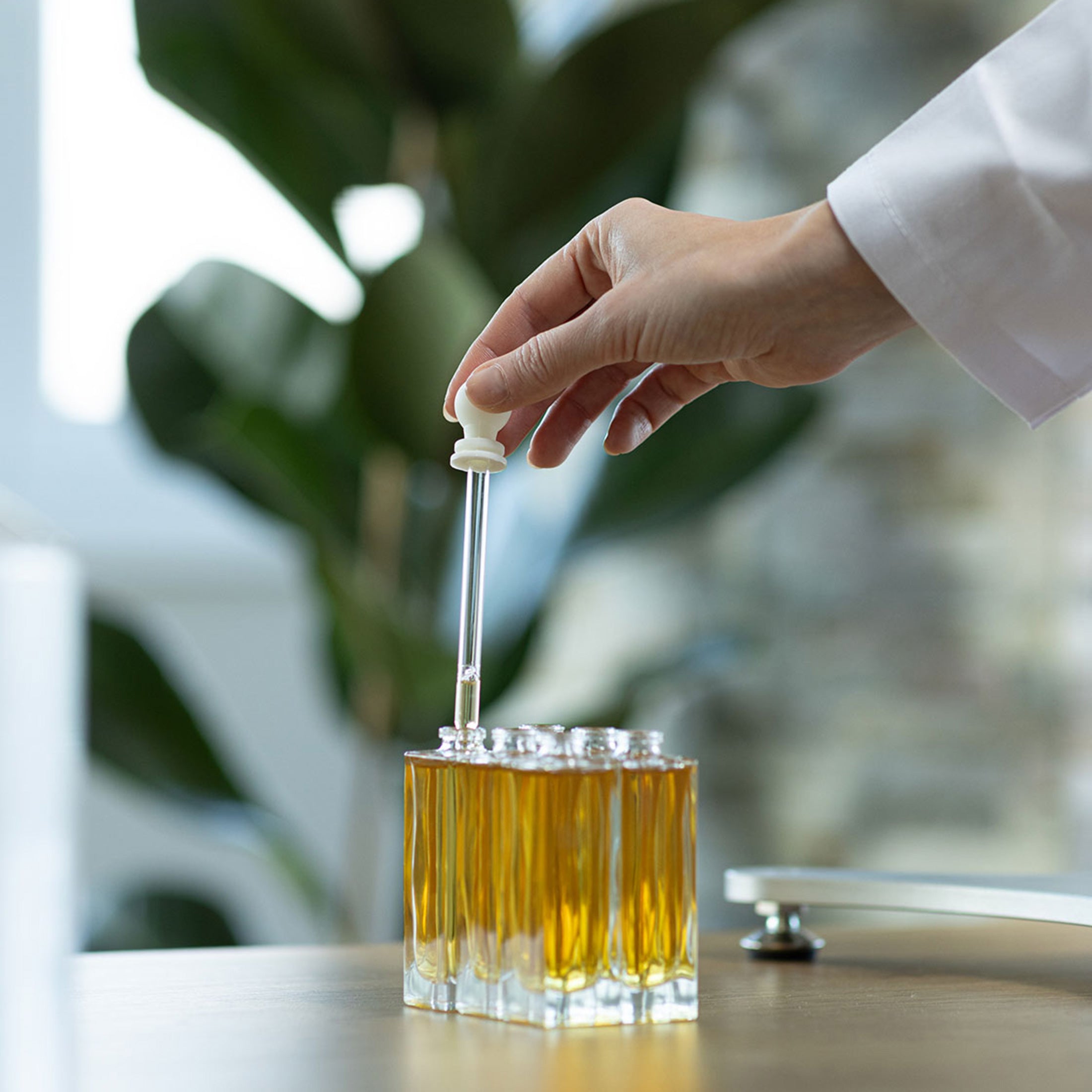
Fragrances and Pregnancy: What You Need to Know
During pregnancy and breastfeeding, it's natural to wonder about the safety of the products we use daily, including fragrances. Changing hormones, heightened sensitivities and the baby's well-being are all factors that lead expectant and new mothers to be cautious.
First thing first, it is advisable to reduce the use of cosmetic products by limiting the number, frequency and quantity applied to the skin. Choose quality, and look for natural ingredients that respect your body.
Precautions to take when using fragrances during pregnancy
Chemical substances found in conventional fragrances, such as phthalates, can cause hormone disruption and have harmful effects on foetal development. What's more, some synthetic compounds can cause allergic reactions or skin irritation.
A safer alternative is to turn to natural cosmetics. They are formulated with essential oils and plant extracts, known for the positive effects they can have on the mind and body. These natural components have been used since the beginning of human existence for their therapeutic properties. Ancient Greeks, Romans, and Egyptians are credited among the first humans to harness the many capabilities of essential oils.
Natural cosmetics, including fragrances can be a safer alternative to synthetic ones, but not all essential oils are safe for pregnant women. Oils like lavender, chamomile, and ylang-ylang are generally considered safe in moderation. These natural oils can provide relaxation, reduce stress, and improve mood, contributing to overall well-being during pregnancy.
Be careful, however, because not all bring the benefits you need during this time. Whether taken orally or through the skin, during the first three months of pregnancy, essential oils, like many other substances around us, are not recommended for the healthy development of the foetus. The first risk is linked to the neurotoxicity of certain essential oils, particularly the ones with high ketone, ethers, sesquiterpenes and sesquiterpenols content. If used in excessive amounts or high concentration, these compounds can cause nervous or respiratory spasms, as well as nausea, which can increase the risk of miscarriage.
To help you see things more clearly, here is a non-exhaustive list of essential oils to be avoided during pregnancy : taken from the book 'Traité d'aromathérapie scientifique et médicale - Les huiles essentielles - Fondements et aides à la prescription written by Doctor Michel Faucon, French pharmacist and aromatologist (2017)' : Aniseed, Ajowan, Dill, Angelica, Basil, Bergamot, Bergamot without bergapten, Cade, Cajeput, Wild Chamomile, Cinnamon, Caraway, Atlas Cedar, Lemongrass, Clove, Combava, Coriander, Sea Fennel, Turmeric, Frankincense, Tarragon, Eucalyptus globulus, Eucalyptus smithii, Fennel, Galbanum, Juniper, Hyssop, Helichrysum Madagascar, Helichrysum Italiana, Khella, Lavandula stoechas, Greenland Ledon, Lemongrass, Lovage, Marjoram, Lemon balm, Peppermint, Spearmint, Nutmeg, Green myrtle, Red myrtle, Lemon myrtle, Himalayan nard, Sweet orange, all Oregano types, Palmarosa, Grapefruit, Patchouli, Douglas fir, Scots pine, Black pepper, Hemlock, Rosemary Camphor, Rosemary, Siberian Fir, Balsam Fir, Mountain Savory, Clary Sage, Turpentine, Thyme, Verbena, Vetiver, Wintergreen.
We recommend that you choose milder essential oils, such as : Roman chamomile, Cardamom, Ginger, Lemon, Eucalyptus citronné, Eucalyptus radiata, Fragrant inula, Noble laurel, True lavender, Fine lavender, Lavandin super, Green mandarin, Shell marjoram, Neroli, Petitgrain bigarade, Ravintsara, Saro, Tea tree, Thyme thujanol, Fragrant verbena, Rose, Rosewood, Geranium, Sandalwood.
Cardamom and Ginger are excellent for combating sickness and nausea, German or Roman Chamomile, Lavender, Neroli, Petitgrain, Rosewood help you relax and promote a good sleep, while Geranium, Lemon, Sandalwood, Wild Orange help you uplift your mood.
Application advice
During pregnancy, hormones can make your skin drier and more sensitive. To avoid allergic reactions or irritation, carry out a skin test before using a new product, or apply it on clothes only. Choose application areas that are away from areas in contact with your baby, who has a sensitive sense of smell, such as wrists, clothing or behind the ears. When applying your perfume, use sparingly, 1 to 2 sprays are enough, you can also reduce the frequency and wear it only on certain occasions.
It's also important to be careful with home fragrances, incense and scented candles. As with products applied to the skin, opt for natural ingredients. Ventilate rooms to dilute airborne particles and avoid staying in the room when using the product so as not to inhale any substances.
At Matca Naturals, we feel it is important to give you the best advice on how to use our products so that your maternity experience goes as smoothly as possible. Always consult with a healthcare provider before using any essential oils during pregnancy to ensure safety for both you and your baby. By understanding the ingredients and selecting safe, natural options, you can enjoy the benefits of aromatherapy while safeguarding their health.









